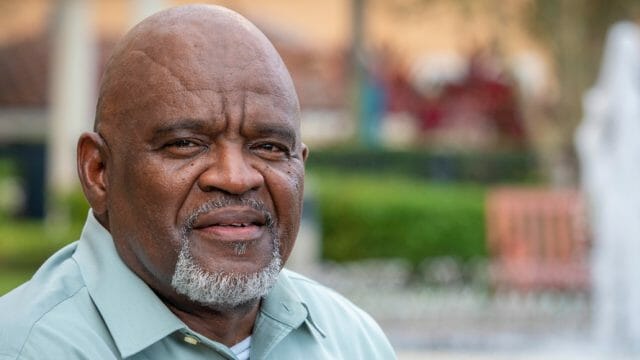Maranatha returns to increase the Adventist footprint in an isolated area.

Water shot out toward the plane’s wings as the engine throttled to a deafening roar, the hull shaking from friction as it screamed across the water. The pilot held the overhead throttle steady as the craft rushed ahead, rattling as it continued to pick up speed until, for a moment, it shrugged slightly off the surface of the river. More minor lifts followed, the plane willing itself to part from this liquid runway as separations ramped up in frequency and then, in an instant, there was calm tranquility — the aircraft soared into smooth open sky.
This exhilarating takeoff is part of the daily routine for missionary pilot Eben Ezer Espinosa Castro. For eight years he’s worked for a ministry that was recently adopted by the Seventh-day Adventist Church in eastern Peru called “Peru Projects.”
“I always had a dream since I was a child, to serve God as a pilot missionary anywhere,” Castro says.
Growing up in Mexico, Castro studied theology at Montemorelos University before heading to the United States to pursue a Master of Divinity degree at Andrews University in Michigan. But his dream faced a huge hurdle: he didn’t have the money to pay for the degree. Throughout his graduate program, he searched for sponsors, was blessed with odd jobs, and was amazed as fervently specific prayers were answered in front of his eyes. He started with nothing and graduated with no debt.
Being free and clear, Castro hesitated to begin studying in the aviation program; with his theology degree he could become a pastor and start earning a salary right away. Again, God provided the necessary funds for him to study aviation. “God clearly opened the way, opened the doors, and showed us that He would fulfill [this dream], and thank God, He did,” Castro recalls.
During his last semester in aviation at Andrews, Castro heard about Peru Projects and its need for a pilot. He could see the skills and education God was giving him as a pastor, mechanic, and aviator; it was exactly what was needed in this ministry. And so, Castro and his family moved to the jungle city of Pucallpa and began to live out his childhood mission aviation dreams. “It was really nice to see confirmation from God that [this journey] was His will, He was guiding us, and He got us through it, because He had a place for us to serve,” Castro said.
This Amazon region of Peru — an expansive sprawl of wild rainforest that includes the Amazon River, the world’s largest by volume — is home to the East Peru Mission of the Adventist Church, the largest mission (a church region that is not yet financially self-supporting) in the country. It is also a region where dozens of indigenous people groups have lived in isolation for generations, maintaining their traditional way of life away from modern society. Today, many of them have experienced the outside world, but some are still truly uncontacted. Their segregated existence has lasted so long because at the edge of the jungle, the roads end. Here, rivers are the thoroughfares for transportation, and the indigenous population is spread out over around 200,000 square miles (more than 500,000 square km) of jungle. Even in a fast boat, Castro explains, it can take 20 to 40 hours to reach some of these villages; in larger cargo boats, it can take days. The huge scale of this place makes evangelism extremely difficult.
“One of the greatest challenges that our mission has is being able to reach [these] communities,” Juan Saldaña, president of the East Peru Mission, admitted. “The pastors who work in the inner river zones, the thickest part of the forest, the biggest difficulty is the transportation.” According to Castro, there are thousands of villages throughout this territory, and the church is actively working in 82 of them, the majority made up of the Shipibo and Asháninka tribes. Village life is simple in these communities — residents grow their own food, raise chickens, and catch fish in the river.
On the surface, this idyllic setting looks like paradise, but Castro has seen firsthand the problems these people face. If someone gets seriously sick out there, they die. There are no hospitals or medical clinics when injuries or illness arise. “So, despite having this beautiful community that looks like paradise, they face things that they don’t have a solution for,” Castro said. “And then they can be discouraged because they don’t know how to face them. So that’s where the value of the gospel message comes in, and they can see to the future, see eternity. That changes their view or their mindset.”
A crucial part of Peru Projects’ ministry is operating emergency medical flights in the jungle for patients in critical need of professional attention. Whether it’s in the amphibious Lake 250 Renegade aircraft or, when a landing strip is available, the Cessna 182, Castro and his team work with embedded missionaries to respond to these time-sensitive situations. Over their years of service, rapport has grown between missionaries and the tribes, allowing for the gospel to spread. As communities create congregations, they need places to worship, which normally takes shape in a rickety wooden structure. These buildings are weakened by the consistent Amazon rain and termites that feed upon the walls. “Right now, most of the churches are falling apart,” Castro said. “It is just the reality.”
The East Peru Mission asked Maranatha to help with proper places of worship in this region. Maranatha has worked there before, building churches and other structures in the mid-2000s. Today, the starting point will be the city of Pucallpa, near Castro’s aviation mission outpost. From there, Maranatha’s work will head down the river to villages spread throughout the jungle.
Glendy Franco de Gomez is a Shipibo woman who grew up deep in the jungle. Her parents were traveling teachers who would move from village to village by boat, educating indigenous children. When she reached adulthood, Gomez followed in her parents’ footsteps, graduating as a teacher from an indigenous university in Pucallpa. Today, she teaches at a government elementary school for indigenous children. She’s also become a leader at the La Selva Seventh-day Adventist Church.
The Shipibos are matriarchal, so women help guide society in many ways. Women are also integral to a church’s stability and future growth. Each Saturday (Sabbath), more than 30 people attend La Selva, including university students who are following in Gomez’s footsteps from the jungle to the city. But Gomez would like to grow that number.
“My dream for the church would be that we win over more souls and that they congregate here — that everyone who comes from the villages will congregate here, and that day by day, we keep working to bring more people to this place to worship God,” Gomez said.
However, a huge obstacle to this goal is the actual structure where they meet. The building is constructed of weak, rain-soaked wood. If strong enough winds blow, the church could collapse, causing serious injuries or worse. There are large gaps in the slat walls — rainfall pours in, flooding the floor. The roof recently flew away in a storm — the members reattached it, but it may not last for long. Also, the metal roof is oppressively hot and humid in the jungle heat. Because La Selva is a growing congregation, there is currently no room for future growth, especially when university students are present during the school year.
With all these challenges, sometimes members simply cannot worship there because the space is unusable. Often, they just stay home where it’s more cool, dry, and safe. Without the financial means to construct a stronger, more permanent sanctuary, La Selva can only wait and pray for a miracle. It’s a story that’s repeated over and over again in Pucallpa.
Maranatha’s commitment to churches in Pucallpa is to provide special roofs that won’t absorb as much of the jungle heat and are quieter in the rain, as well as strong, permanent steel frames that will last for generations. Congregations will then build up the walls using local materials. To La Selva’s delight, its church was on the list of churches that Maranatha is helping. “It’s a big help for us because, in reality, those of us who congregate, we have very few professionals who can build,” Gomez said. “We can continue to save and finish the church.”
Maranatha established a workshop in Pucallpa where all of the components for churches in this region will be fabricated. The organization’s in-country crew is creating these steel elements, and entire church frames have gone up at sites throughout the city. Soon, La Selva will demolish its current structure to make way for a solid, permanent one, ushering in a new phase of possibilities for evangelism and growth that Gomez dreams of.
Work has already begun on these new buildings, and soon La Selva will be set to pursue its dreams. This same joy will be shared by church members throughout the city of Pucallpa. Congregations are beginning to demolish their old, unsafe buildings in preparation for Maranatha to arrive. Soon, they’ll be worshiping in permanent structures through which the gospel can shine for generations. Maranatha is also drilling water wells in Pucallpa in situations where there is need.
After Maranatha’s initial commitment in Pucallpa is complete, the city will continue to serve as the launching pad deeper into the Amazon. Crews will start moving down the river into more remote communities that are harder to reach. This will present unique logistical challenges, from making site visits with native congregations to transporting materials, workers, and volunteers. It’s a challenge that Maranatha country director Elmer Barbosa relishes. “It’s going to be difficult,” Barbosa said. “We’re going to have to use boats sometimes, we are going to have to fly to places … but no one’s going [to these villages]. Even the church has a challenge to reach those people. And if we partner with them, I think we can bring hope to those people and be the way that they get to know Jesus.”
Castro said he is excited for the possibilities of how God will use Maranatha and its volunteers to reach people from different tribes and tongues. He knows that the warmth and hospitality of the people of these remote communities will be felt by Maranatha. “I think it’s a big opportunity and a blessing for the indigenous people, and for the volunteers that come, because people in the jungle are very receptive … they’re very friendly,” Castro explained. “So, if we bring volunteers, it’s easy to work with the villagers, and it will definitely be an impact for them — for the community, as for the volunteers that are involved there.”
The original version of this release was posted on page 8 of The Volunteer magazine, Issue 3, 2023. Maranatha Volunteers International is an independent supporting ministry and is not operated by the corporate Seventh-day Adventist Church.















